Hwajung Hong
Automatically Evaluating the Paper Reviewing Capability of Large Language Models
Feb 24, 2025Abstract:Peer review is essential for scientific progress, but it faces challenges such as reviewer shortages and growing workloads. Although Large Language Models (LLMs) show potential for providing assistance, research has reported significant limitations in the reviews they generate. While the insights are valuable, conducting the analysis is challenging due to the considerable time and effort required, especially given the rapid pace of LLM developments. To address the challenge, we developed an automatic evaluation pipeline to assess the LLMs' paper review capability by comparing them with expert-generated reviews. By constructing a dataset consisting of 676 OpenReview papers, we examined the agreement between LLMs and experts in their strength and weakness identifications. The results showed that LLMs lack balanced perspectives, significantly overlook novelty assessment when criticizing, and produce poor acceptance decisions. Our automated pipeline enables a scalable evaluation of LLMs' paper review capability over time.
LLM-Driven Learning Analytics Dashboard for Teachers in EFL Writing Education
Oct 19, 2024
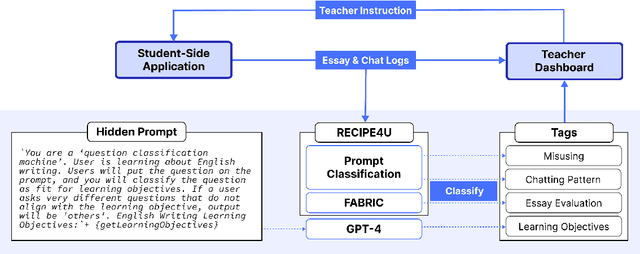
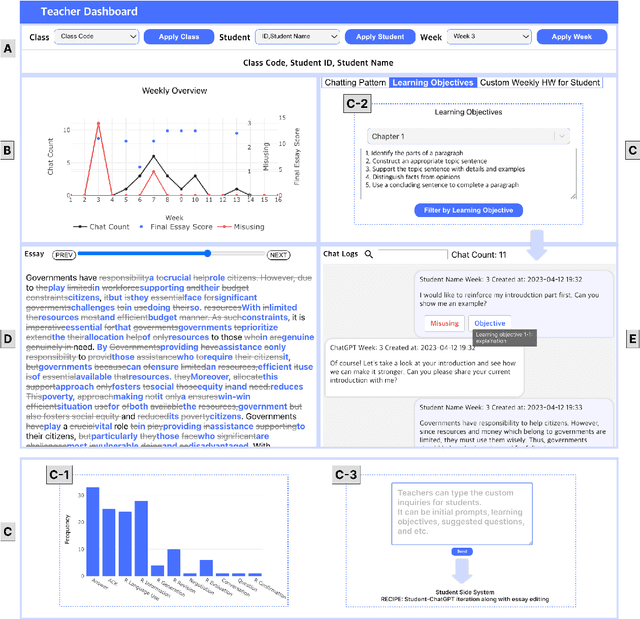
Abstract:This paper presents the development of a dashboard designed specifically for teachers in English as a Foreign Language (EFL) writing education. Leveraging LLMs, the dashboard facilitates the analysis of student interactions with an essay writing system, which integrates ChatGPT for real-time feedback. The dashboard aids teachers in monitoring student behavior, identifying noneducational interaction with ChatGPT, and aligning instructional strategies with learning objectives. By combining insights from NLP and Human-Computer Interaction (HCI), this study demonstrates how a human-centered approach can enhance the effectiveness of teacher dashboards, particularly in ChatGPT-integrated learning.
AACessTalk: Fostering Communication between Minimally Verbal Autistic Children and Parents with Contextual Guidance and Card Recommendation
Sep 17, 2024Abstract:As minimally verbal autistic (MVA) children communicate with parents through few words and nonverbal cues, parents often struggle to encourage their children to express subtle emotions and needs and to grasp their nuanced signals. We present AACessTalk, a tablet-based, AI-mediated communication system that facilitates meaningful exchanges between an MVA child and a parent. AACessTalk provides real-time guides to the parent to engage the child in conversation and, in turn, recommends contextual vocabulary cards to the child. Through a two-week deployment study with 11 MVA child-parent dyads, we examine how AACessTalk fosters everyday conversation practice and mutual engagement. Our findings show high engagement from all dyads, leading to increased frequency of conversation and turn-taking. AACessTalk also encouraged parents to explore their own interaction strategies and empowered the children to have more agency in communication. We discuss the implications of designing technologies for balanced communication dynamics in parent-MVA child interaction.
MindfulDiary: Harnessing Large Language Model to Support Psychiatric Patients' Journaling
Oct 08, 2023Abstract:In the mental health domain, Large Language Models (LLMs) offer promising new opportunities, though their inherent complexity and low controllability have raised questions about their suitability in clinical settings. We present MindfulDiary, a mobile journaling app incorporating an LLM to help psychiatric patients document daily experiences through conversation. Designed in collaboration with mental health professionals (MHPs), MindfulDiary takes a state-based approach to safely comply with the experts' guidelines while carrying on free-form conversations. Through a four-week field study involving 28 patients with major depressive disorder and five psychiatrists, we found that MindfulDiary supported patients in consistently enriching their daily records and helped psychiatrists better empathize with their patients through an understanding of their thoughts and daily contexts. Drawing on these findings, we discuss the implications of leveraging LLMs in the mental health domain, bridging the technical feasibility and their integration into clinical settings.
FABRIC: Automated Scoring and Feedback Generation for Essays
Oct 08, 2023

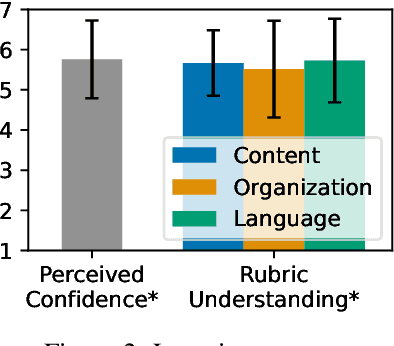
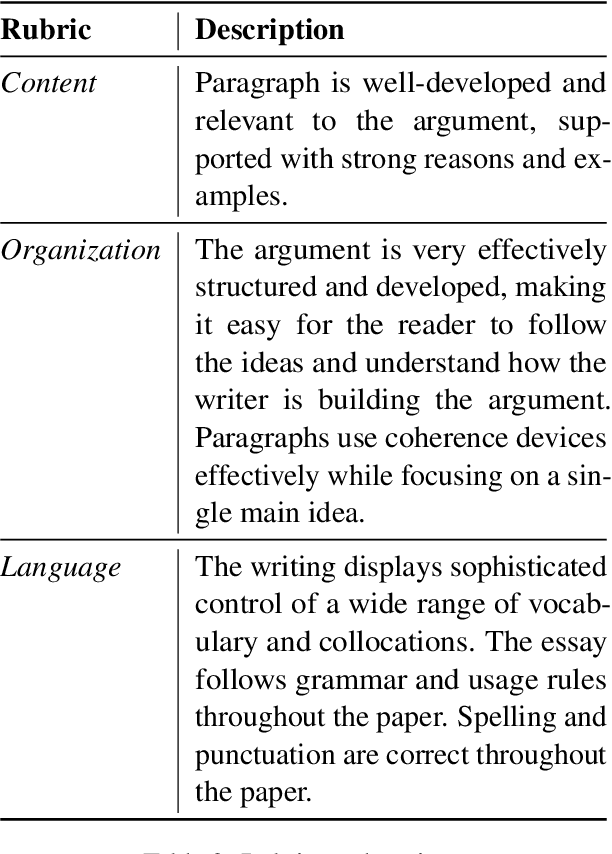
Abstract:Automated essay scoring (AES) provides a useful tool for students and instructors in writing classes by generating essay scores in real-time. However, previous AES models do not provide more specific rubric-based scores nor feedback on how to improve the essays, which can be even more important than the overall scores for learning. We present FABRIC, a pipeline to help students and instructors in English writing classes by automatically generating 1) the overall scores, 2) specific rubric-based scores, and 3) detailed feedback on how to improve the essays. Under the guidance of English education experts, we chose the rubrics for the specific scores as content, organization, and language. The first component of the FABRIC pipeline is DREsS, a real-world Dataset for Rubric-based Essay Scoring (DREsS). The second component is CASE, a Corruption-based Augmentation Strategy for Essays, with which we can improve the accuracy of the baseline model by 45.44%. The third component is EssayCoT, the Essay Chain-of-Thought prompting strategy which uses scores predicted from the AES model to generate better feedback. We evaluate the effectiveness of the new dataset DREsS and the augmentation strategy CASE quantitatively and show significant improvements over the models trained with existing datasets. We evaluate the feedback generated by EssayCoT with English education experts to show significant improvements in the helpfulness of the feedback across all rubrics. Lastly, we evaluate the FABRIC pipeline with students in a college English writing class who rated the generated scores and feedback with an average of 6 on the Likert scale from 1 to 7.
Exploring the Effects of AI-assisted Emotional Support Processes in Online Mental Health Community
Feb 21, 2022
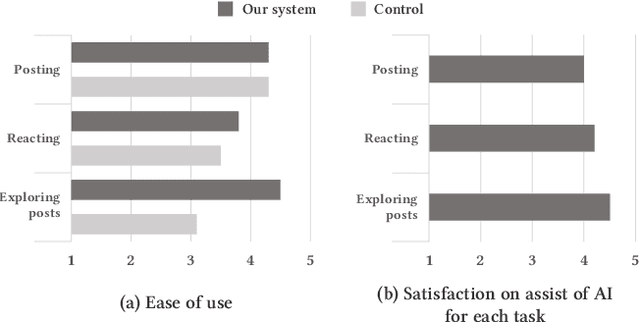
Abstract:Social support in online mental health communities (OMHCs) is an effective and accessible way of managing mental wellbeing. In this process, sharing emotional supports is considered crucial to the thriving social supports in OMHCs, yet often difficult for both seekers and providers. To support empathetic interactions, we design an AI-infused workflow that allows users to write emotional supporting messages to other users' posts based on the elicitation of the seeker's emotion and contextual keywords from writing. Based on a preliminary user study (N = 10), we identified that the system helped seekers to clarify emotion and describe text concretely while writing a post. Providers could also learn how to react empathetically to the post. Based on these results, we suggest design implications for our proposed system.
 Add to Chrome
Add to Chrome Add to Firefox
Add to Firefox Add to Edge
Add to Edge